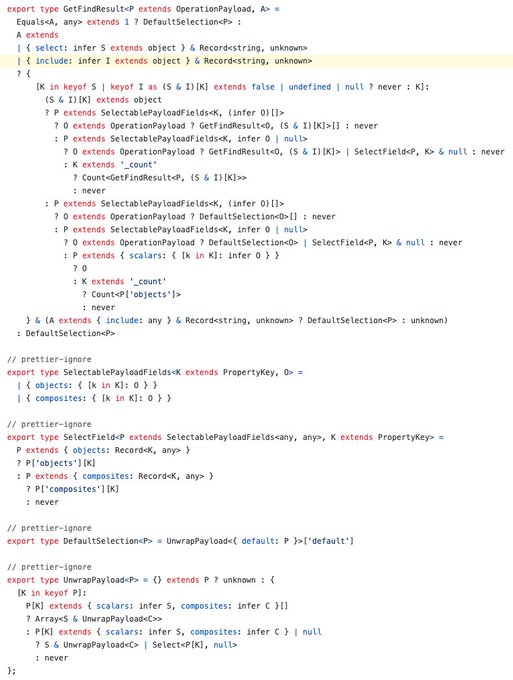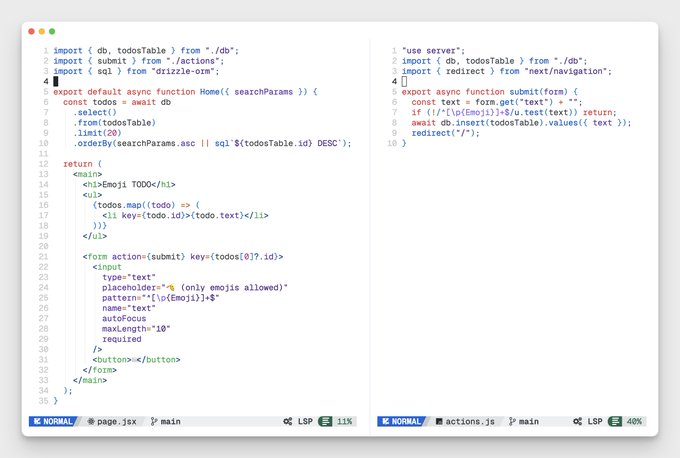
Matt Wonlaw
@tantaman
Followers
1,596
Following
645
Media
213
Statuses
2,505
Explore trending content on Musk Viewer
ハロウィン
• 912109 Tweets
Valencia
• 570224 Tweets
DANA
• 458980 Tweets
ポケポケ
• 117953 Tweets
Esenyurt
• 59845 Tweets
Ahmet Özer
• 47494 Tweets
Mercadona
• 44719 Tweets
フレンド
• 43900 Tweets
AEMET
• 42189 Tweets
LINGORM X TIGERCRY
• 40010 Tweets
RTVE
• 39329 Tweets
Turia
• 38374 Tweets
ピカチュウ
• 34050 Tweets
LINGORM N2U LIVE
• 32034 Tweets
Albacete
• 29126 Tweets
自民党会派入り
• 28031 Tweets
橋本環奈
• 21317 Tweets
ジェイド
• 21190 Tweets
フロイド
• 21145 Tweets
ポケモンカード
• 20891 Tweets
中川大志
• 18001 Tweets
ポケカのアプリ
• 15350 Tweets
ミュウツー
• 14952 Tweets
コミコン
• 13193 Tweets
オースティン
• 12695 Tweets
#うちの本丸の厨番長
• 12555 Tweets
Last Seen Profiles
Pinned Tweet
My 4th appearance on a podcast! I'm becoming a better guest (interviewee?) each time, which means this one is the best one :)
This time we cover colocated queries, materialized views, sqlite & crdts.
4
3
43
"Most databases were built when data was static and queries were dynamic. For applications, most queries are static and the data is dynamic" -
@matthew_linkous
I never thought about it this way before but this is spot on.
2
6
138
I was blown away by
@aboodman
's talk and the Replicache model so I spent the last day experimenting with a variation on the idea:
"Creating CRDTs without specialized knowledge"
5
16
68
I was accepted to give a talk about & local-first software at
#DWebCamp2023
! 🎉
See you there!
@GetDWeb
2
5
37
Almost have the entire SQLite dialect covered for type generation. Preview of joins & sub-selects.
Builtin functions, conditionals, with clauses, etc. supported as well!
Next up: syntax highlighting and intellisense
Pairing with TreeSQL is going be 🔥
In collaboration with SkipLabs, Riffle and
@tantaman
, we sketched out a simple SQL query extension for GraphQL-like nested query results. 👀
It's already really nice to use and will allow me to simplify my application (e.g. by removing GraphQL on top of SQLite).
5
5
55
5
1
33
@kentcdodds
@joeflateau
Rust has a ? operator which will automatically return an error if one is encountered. Eg: ‘()?’.
This is pretty close to exception ergonomics but typed and thus checked at compile time.
1
0
28
I used to think forking sqlite (e.g.,
@libsqlhq
) was crazy but I'm on board now. While SQLite is great, I just don't think it is ready for the demands of the coming years.
Just one tiny tiny slice of the mounting problems --
2
3
28
It's been 1 year + 2 days since got started.
My
#LocalFirst
journey started way back in 2012 with
A presentation editor that ran entirely locally in the browser.
Its remote storage solution at the time was
2
3
28
@VicVijayakumar
I guess Netflix includes RSUs in their calculation, the others are just base pay?
4
0
22
@jmhodges
Facebook handles most of these problems by converting all queries to persisted queries at compile time. That allows you to know exactly what queries can be executed and to what depth and so on. Authz is handled at the individual node level via fwrks like
3
0
21
@ssalbdivad
Yes, that is true. I'm explicitly opting into this so I can provide a rich API for users. `appease` was a poor choice of phrase.
3
0
16
So who is going to write about how local-first can be a progressive enhancement? I know this sounds like a contradiction in terms.
5
1
16
Looking forward to doing some TinyBase explorations backed by SQLite this week.
Could be a big week for TinyBase. I'm pretty excited about SQLite & CRDT synchronization in v4.0 - nearly there!
I just put up a fun TinyBase version of
@tantaman
's awesome cr-sqlite demo to give you an idea.
Let's go!
2
3
36
0
1
16
@captbaritone
Yeah, they're railroad diagrams and fairly common in the compiler space. The JSON spec uses them too:
and a library to generate them if you're interested --
0
0
15
@pvh
All my intuition points to the opposite of this quote being true.
- Devices have tons of compute and storage waiting to be used
- Cloud costs are crazy
- Privacy matters to people
- Given how many devices people have, data actually lives longer when local and replicated to peers
1
1
13
@brian_lovin
Just let my apps interoperate. I don’t want ten calendar, email, doc, sheet apps.
2
0
14
If you've been wondering what I've been working instead of cr-sqlite the last several months, tune in to the talk!
On my way to
@localfirstconf
. Really excited to talk about taking sync mainstream:
Thank you very much to
@schickling
for organizing and the endless energy to bootstrap this community.
@rocicorp
is proud to sponsor, and looking forward to many more
3
0
65
1
0
14
If we made houses like software: we'd have proprietary electrical sockets, our homes would only work with appliances made by the manufacturer of the home, we'd be charged a fee for exchanging money in the house.
@brian_lovin
Just let my apps interoperate. I don’t want ten calendar, email, doc, sheet apps.
2
0
14
3
1
13
@enlightenedcoop
lots of repliers are misunderstanding how intention is used here. They’re reading it as “good intentions” rather than being intentional and crafting one’s life like a work of art. Fascinating.
0
0
11
@kriswuollett
@jmhodges
more or less. The upside is you can ship quickly and then optimize when there's actual problems.
Of course there should still be _some_ up-front thinking in terms of expected query patterns and modeling the data in a way to serve those kinds of queries.
1
0
12
💯. Transactions, mvcc, rollback, persistence, queries over objects should all exist in your language.
"Database features should be language features"
Alexander Stigsen from
@realm
shares his insights into how with local-first you want to bland the gap between the database and the language.
0
6
48
0
0
12
I'm excited about pulling in the more complicated operations () and using differential dataflow to maintain the views for an application that is entirely event sourced. Having a fully event-source app unlocks new things --
1
1
11
@DoomChild2
@Grady_Booch
mono vs many is an incidental detail.
You want, regardless of repo structure:
- atomic commits across _all_ your code
- atomic deployments based on a single sha
- ability to bisect the entire codebase to automatically find bugs
Monorepos are the only tool for this currently.
1
0
11
This is just full of gems. I've found my kindred spirit?
@CoderHi
Using SQLite as your reactive data store and single source of truth ~36 min in
Also eschewing ORMs and doing everything via store procedures ❤️
1
1
11














































































